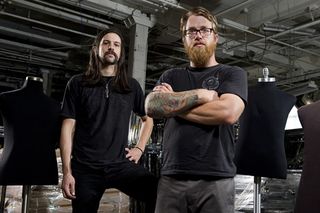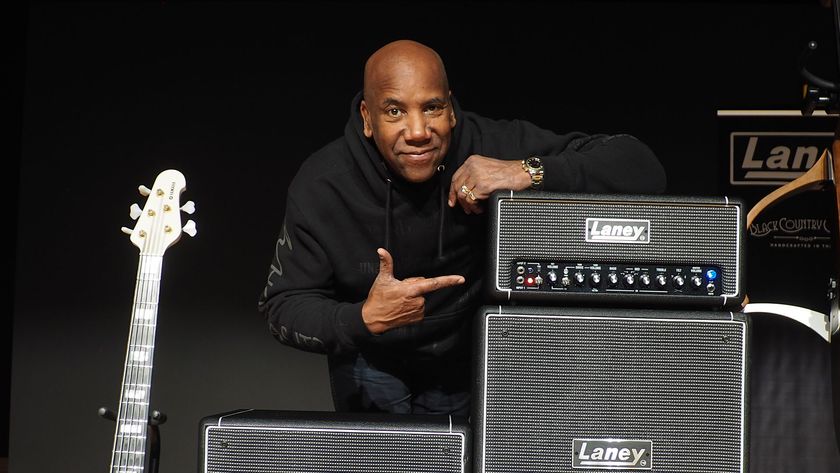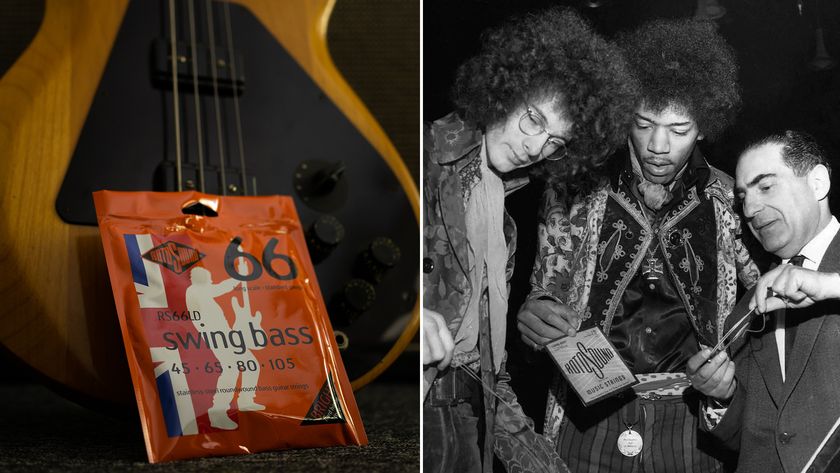Interview: A Life Once Lost Guitarist Doug Sabolick Talks Touring, Gear and 'Ecstatic Trance'

Philadelphia-based modern heavy metal band A Life Once Lost released their fourth full-length studio album, Ecstatic Trance, on Season Of Mist records late last year. To support the release, they did a North American touring run with Revocation.
Now they’re gearing up for a short US headline run — dubbed The Man Machine tour — with support from Author & Punisher and Encrust.
I recently caught up with guitarist Doug Sabolick to talk about all things pertaining to him and the band. Read the conversation below, and visit the band online on their official facebook page.
GUITAR WORLD: Let’s talk about your latest album, Ecstatic Trance. The title is pretty interesting. Does it aptly describe the music on the album?
I think it opens some doors for people who see that and expect a certain style of music, specially with the cover art and everything. But I think it’s almost a concept album in that regard, and it's all based on just one thought.
Would you say it’s more melodic and steps outside of what you’ve done so far with the band?
Oh yes, it’s much more melodic, but not in a "singy" way. The guitar lines are more melodic and the songs are melodic, but they still retain their heaviness and their rhythmic attack.
Get The Pick Newsletter
All the latest guitar news, interviews, lessons, reviews, deals and more, direct to your inbox!
For this album, you’ve used Andreas Magnusson, who has produced albums for Black Dahlia Murder and Impending Doom, who are more death metal-type bands. What was his approach when he was working with you?
He didn’t actually produce the album. He just mixed and engineered the album, and I produced it myself. I just felt that he captured a really modern version of what we were trying to do, and I think he is very good. He does a great job with the records he puts out. Lots of work he’s put out has been really heavy, and although I can’t really connect with the music of the bands he has worked with, when it comes to their mixes and production, I like his work. It was a really good fit for us.
Is there anything different in your gear setup this time because of the change in musical style?
I went to a 7-string, I lowered the tuning of the riffing down to D, and I kept my higher register strings tuned to standard. So I really had a wide range of notes I could hit that really wouldn’t drown each other out. You could have the leads going over the riffs. And then all the leads I played out of a little amplifier that my brother took out of a Hammond organ. It was like a reverb amplifier, little 18-watt amplifier out what might have been a P12Q speaker.
We’ve always used modern guitar amplification on our past albums, so this time I tried to set up something that would sound really vintage, cranked up and with a wah pedal. So that’s what I was using for this album. The gear’s a lot different for this album, at least for me. We’ve also included a lot of organ on the album. There’s organ on every song. It’s more for support, which I feel what organ should be for except in certain cases. When I played it, it was definitely for support because I’m not a real organ player. I just use it to craft songs. So the inclusion of organ on the album is a big difference.
In order to get all these instruments to work together, I had to write songs in a different way. Our songs have always been atonal, a pissed-off barrage. I didn’t want to be held to that anymore. I saw a bigger picture of what the band could be. I’ve listened to bands like Kraftwerk and said to myself, "Man, if there was a heavy metal version of Kraftwerk, that will be fucking awesome, with some psychedelically inspired leads over the top."
It was the kind of thing I had in my head for a while and I was like, that’s what I really want to do. I want to be happy and proud of myself. At the end of the day, even if we ended up broke, at least I’d know that I followed what I really wanted to do. It’s scary to change it up so much. We had a solid fan base through what we were doing, but to me, I play music for myself, and the same goes for Bob [Meadows, vocals].
We didn’t want to be pigeonholed playing to a certain audience. When you look at the artwork, do you really see metal bands with artwork like that? Do you see metal bands with album titles like that? It doesn’t happen because all metal bands are too afraid to step outside the box. We’re open to a lot of different kinds of music, so we wanted to incorporate all the things that we like about music, in our band and in our sound. And we’ve created something unique, and that above all is the No. 1 thing. You can create a great album but if you’re not the first one to do it, you’re just fighting for scraps from everyone else. But on this album, we’ve definitely created a niché for ourselves.
So you’re on Season Of Mist for this album, and they have such a different kind of roster. They have Saint Vitus and black metal bands. Does it feel weird at all for you to be on such a list where you stand out?
I think it’s cool, and I think it shows that the music we’re making is credible because a lot of the bands on their label are credible. They have a wide variety of bands I respect in all different genres. I’m more proud to be on there than I was to be on Ferret at the end. No disrespect to them. But with Season Of Mist, they are music lovers and they sign bands that they like, and they seek them out. So they like our music and I’m happy to be with them. I think it worked out.
Because of the heavy instrumentation on the album, how do you approach playing such material on stage?
We’ve been playing shows where we’ve pretty much played the whole album! There are no problems. I just have to use technology and do some things a little differently when it comes to running the organ tracks when we play. So in a way it makes the band sound huge but you also have to really be on top of it. If you mess up, it’s a problem and you can’t just cover it up.
You took almost five years for this album. Was it mainly because you were kind of redefining your sound, or were there other reasons for the gap?
There are a lot of different reasons, but the original reason was that we had toured hard for years. After a while, it starts getting old when people aren’t supporting you, like your label or things like that. When you’re on a tour bus there’s really not much money to be made, which is fine, but if you do it for five years straight, at some point you’re just like, "You know what? I can make the amount of money I do on tour in one night of working a regular job. So let’s just relax and have a personal life for a little while."
So we did that, and then we thought of getting together to start working on a new album and it just seemed like certain members of the band were dragging us down and slowing the process. So we had to kind of take care of all these different things and member changes. It took me a while to be confident to do things for the new album. I was scared when we did that, because I wasn’t sure and there was no guarantee that this album was going to turn out good. I had to overcome every weakness I had. I had to just get through it all and I’m really happy we got this album out because it could have been way different, you know. And also it’s not like we took five years and then put out the same album. We took five years and put out an album that blows the other albums away, so that makes me happy.
Did starting out and learning your trade in Philadelphia have any kind of impact and did you absorb anything musically from the local scene?
We started this band when we were teenagers, and back then it was a crazy scene with all these people that would just come out of the woodwork for a metal show because it was just so underground at that time. There was no "mall metal." There was none of this, really. I mean, it was there but were all going to hardcore shows. And it’s funny that 15 years later the people that pop up are in bands that aren’t metal bands, but I know them from that scene from a long time ago. In Philly, there’s music every night everywhere.
That definitely influenced me for this album. I wouldn’t say it did as much in the past and we weren’t really influenced by local bands in the past, but I work at a bar that has music every night, and I saw a lot of different things. If you see so much, you’re bound to develop a liking or a dislike for a few things you hadn’t heard before. I kind of just took the things that I liked, and it inspired me to do something more and not just pigeonhole my band as just another metal band, really.
Andrew Bansal is a writer who has been running his own website, Metal Assault, since early 2010, and has been prolific in covering the hard rock and heavy metal scene by posting interviews, news, reviews and pictures on his website — with the help of a small group of people. Up till February 2012 he was based in Los Angeles. After that, he had to move to India, but is still carrying on his heavy metal endeavors with the same intensity.




“It’s always in the back of your mind saying, what can we improve on? What would I do? What would I dream of in an amp?” How Clapton collaborator and session great Nathan East is teaming-up with Laney on a signature amp unlike any other

“Walk Like an Egyptian was so silly. But solid players have asked, ‘What are you playing at the end?’” Vicki Peterson sees herself as “a bit of a hack player,” but she still made guitar-pop history with the Bangles – and guested with Tom Petty







